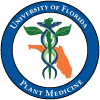Dr. Rebecca Barocco
 Featured in: DPM Fall 2017 Newsletter
Featured in: DPM Fall 2017 Newsletter
Q: Describe your academic background?
A: I obtained a BS degree in Horticulture at the University of Arkansas, Fayetteville in the fall of 2009. After graduating, I spent some time in the plant pathology department in Arkansas and then worked on a small CSA farm before deciding to pursue the DPM program from 2012-2016.
Q: What is your current occupation and how has your DPM degree aid-ed you in the tasks and responsibilities associated with your position?
A: My current position is a Post-doctoral Associate in plant pathology at the UF/IFAS NFREC in Quincy, FL. I am part of the agronomy and plant pathology team working on carinata and peanut research. One of our current projects is to develop high-throughput phenotyping methods using imagery and computer vision. This data combined with other agronomic and disease management trials will ideally discover the best cultivars and management strategies for growing carinata in the Southeast. The imagery techniques we develop for carinata will be then be translated for use in peanut research in the summer. Because the DPM program is integrated across a variety of fields in applied crop science, it was a great preparation for my current position. Although I am technically in the plant pathology department, I am part of a cross-discipline team in field research. The DPM program also allowed me to take a variety of electives in GIS, precision agriculture, and Unmanned Aerial Systems (UAS), which are directly relevant to my current position.
Q: What prompted you to pursue your present career and where are you located?
A: From the start of my DPM program, I was interested in focusing on GIS and precision ag technology and quickly developed an interest in UAS imagery, environmental field sensors, and decision support systems (DSS). I was very fortunate to be hired as a post-doc in plant pathology on the main campus in Gainesville after graduating where I was able to explore some of these areas and how they can be useful for crop production. I was then recently given the opportunity to work more intensely in these areas by transferring to the NFREC in Quincy. It is also nice that the position has brought me closer to some of my family along the northern Gulf Coast area. Crop production is becoming more data-driven and automated, and I am excited about being a part of this transition. I hope to build a career where I can translate what I learn in this position to fruit and vegetable production as well as continuing to work with agronomic crops.
Q: Why did you choose to enroll in the DPM program?
A: I chose the DPM program, because the factors affecting crop production are so intertwined. For example, plant weakness due to poor water management can increase susceptibility to disease. I certainly think the knowledge obtained through specialists, such as genetic research, is vital to improving crop production. However, it’s important to step back and look at the whole picture, particularly when engaging in field research and production, and I personally prefer working in the field and on computers than working in the lab.
Q: From a personal standpoint, how has your DPM degree influenced you?
A: The DPM degree has helped me realize that crop science is more than the sum of its parts with a variety of factors that influence production, profits, and environmental impact. I have come to understand that knowledge and appreciation of the natural environment of crops as well as the human aspects of farming are necessary to develop solutions for overcoming issues facing agricultural production.
Q: Are there any challenges that your DPM degree has helped you overcome?
A: My main personal challenge is reaching out to others and asking questions in fear of revealing my own ignorance or being a bother. The DPM degree has helped me to realize that it is a necessity to reach out to specialists and knowledgeable professionals when dealing with multi-disciplinary challenges. I realize that everyone has their strengths and weaknesses that can be pieced together to meet these challenges, and people who are passionate about what they do are happy to share their knowledge.
Q: Do you have any advice or words of wisdom for current DPM students?
A: Don’t take anything too seriously and remember to laugh and have fun !
“A man wrapped up in himself makes a very small bundle.”
– Benjamin Franklin
